May
31
2016
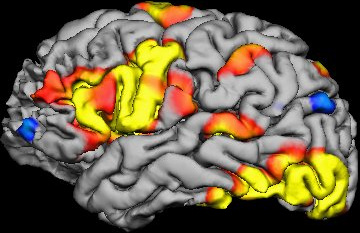 Do we truly have free will? This is a vexing question, and as with the question of consciousness, there are complementary philosophical and neuroscientific approaches. Philosophy gives thoughtful possible answers given what we know, but neuroscience advances what we know.
Do we truly have free will? This is a vexing question, and as with the question of consciousness, there are complementary philosophical and neuroscientific approaches. Philosophy gives thoughtful possible answers given what we know, but neuroscience advances what we know.
As I have discussed many times before, the totality of neuroscientific evidence strongly supports the conclusion that consciousness is a phenomenon of brain function. Dualist philosophies, those that posit that consciousness is anything other than or in addition to brain function, are simply trumped by the scientific evidence.
Free will, however, is a thornier question and more entangled with the philosophy. There are those who maintain that free will is entirely an illusion, because our brains are machines so they must follow physical laws which determine their behavior, hence our behavior, therefore no true free will. While I do not think this can reasonably be refuted, some think the real question is whether or not we make choices. If we do, whether or not those choices are free from physics, then perhaps that can be considered a form of free will.
Putting aside the philosophical question here, the neuroscientific question is this – to what extent do we make conscious choices vs subconscious choices?
Continue Reading »
May
30
2016
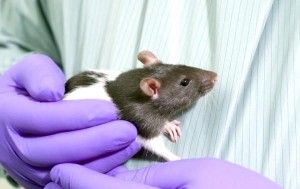 Mother Jones headline declares: “Game-Changing” Study Links Cellphone Radiation to Cancer.” NBCNews was similar: A Possible Cellphone Link to Cancer? A Rat Study Launches New Debate.
Mother Jones headline declares: “Game-Changing” Study Links Cellphone Radiation to Cancer.” NBCNews was similar: A Possible Cellphone Link to Cancer? A Rat Study Launches New Debate.
Any evidence that might link cell phone use to cancer is of legitimate concern, but this is a classic situation in which such evidence needs to put into proper context. I will start with some reassuring clinical context – human epidemiology data has failed to show any consistent association between cell phones and cancer. Further, brain cancer rates have not been increasing overall in the last 20 years when cell phone use skyrocketed. Therefore, any real world effect of cell phones on humans must be tiny to nonexistent.
Toxicology science, however, looks at questions several ways. The most definitive evidence would be placebo-controlled trials, but we almost never have this because it is unethical to expose a subject to a possible toxin just to see if it has a negative effect. (You can do this as part of a therapeutic trial where there is a greater chance of benefit to the subject, but not just to test toxicity.)
Continue Reading »
May
27
2016

One of the recurring themes of this blog, and of the skeptical movement itself, is that science news reporting is generally poor. It is highly variable – there are some excellent science news reporters out there, but most are mediocre and some are terrible. The problem is that the average quality is simply too low.
The problem is compounded by the fact that scientists sometimes overhype or overinterpret their results, but even more common, the press office for the university at which the scientists work often sensationalize the science. At every step there is an opportunity to add hype, misinterpret the actual results, sensationalize, focus on the speculative aspect of the study rather than the actual data, or simply get the story wrong.
The race for clicks seems to be driving the quality of science reporting down, favoring clickbait headlines. Reporters don’t seem to mind getting the story wrong and then being corrected by science bloggers, for then they just get another round of clicks correcting their own bad reporting as if it were someone else’s fault.
Sclerocormus parviceps Continue Reading »
May
26
2016
 Yesterday I saw a bumper sticker that stated, “Save the Bees, Buy Organic.” Of course, a bumper sticker is not the place for a nuanced or thorough treatment of a complex topic. It is a venue suitable for simplistic slogans.
Yesterday I saw a bumper sticker that stated, “Save the Bees, Buy Organic.” Of course, a bumper sticker is not the place for a nuanced or thorough treatment of a complex topic. It is a venue suitable for simplistic slogans.
People like simple narratives, but reality rarely conforms to our desires. This has led to a frequent reminder, popularized by Ben Goldacre, that you will often find the situation (pretty much whatever situation you consider) is more complex than it might at first seem. That is a good rule of thumb – it is fair to assume as a default that any topic is more complex than your current understanding, or how it is being presented in the media, or how it is understood in the public consciousness.
Complex and ambiguous situations, like the fate of our pollinators, become a convenient Rorschach test for ideology. People tend to impose on this complex and not fully understood situation whatever simplistic narrative suits their beliefs and values, like the notion that organic farming will somehow save the bees. Continue Reading »
May
24
2016

This is the title of a change.org petition started by former naturopath, Britt Hermes. Please take some time to read and hopefully sign it.
Hermes has a significant insight into the state of naturopathic practice and education, since she was trained as a naturopath. She came to the conclusion that she was duped into a scam of a profession and now she tries to raise awareness of naturopathy to protect others from this scam.
Pseudosciences often depend upon ignorance of what they actually are in order to promote themselves and gain public approval. In the case of naturopaths they also depend upon the ignorance of politicians as they seek licensure, and then to expand their practice privileges and to force insurance companies to pay for their services.
In short, naturopaths desire all the status and privileges of medical doctors, but without the training, experience, or science-based standard of care.
You may think I am being hard on naturopaths, but that is likely because they have been successful in selling their narrative and confusing the public about what they actually do.
Continue Reading »
May
23
2016
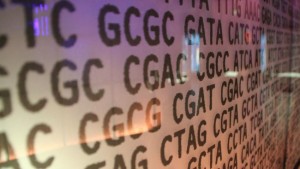 A genetic testing company, Myriad, is embroiled in a controversy over who owns genetic information. The company performs genetic testing, such as for BRCA1 and BRCA2 genes with variants that are associated with higher risk of breast cancer.
A genetic testing company, Myriad, is embroiled in a controversy over who owns genetic information. The company performs genetic testing, such as for BRCA1 and BRCA2 genes with variants that are associated with higher risk of breast cancer.
It has been the company’s policy to release information to their clients on any pathological gene variants, those known or suspected of being associated with higher breast cancer risk. If, however, the client has what is currently believed to be a benign variant, that is all they are told. They aren’t given the specific information about the gene sequence, just a note that it is benign.
Further, the company has declined to share its vast database of information with open source databases being used for research. The company cited patient privacy as their reason for not sharing data.
Now, several clients have sued Myriad to have their full genetic information released to them. It turns out a new rule under HIPPA (the Health Insurance Portability and Accountability Act) requires that companies release full genetic information to patients. Faced with this the company has decided to release the information to those who request it, but insist that it is voluntary and will still not release such information routinely (only to individuals who request it).
Continue Reading »
May
19
2016
There has been a lively exchange surrounding John Horgan’s article about skeptics, which I responded to previously. (See also Orac’s and Daniel Loxton’s responses.) At the core of Horgan’s piece is a logical fallacy so common, I feel it deserves special attention. In fact, PZ Myers wrote approvingly of Horgan’s fallacy, showing that it is still alive and well.
That fallacy can be called the fallacy of relative privation, which is a type of red herring or distraction from actual issues. The fallacy is essentially an argument that a problem is not important or does not deserve attention and resources because there are other more important problems. “Why are you wasting your time on X when there are children dying of cancer?”
In Horgan’s case, he would like us to end all war and bring about everlasting world peace before we tackle lesser problems like quackery, fraud, global warming, vaccine denial, the environment, and other such trivialities.
Continue Reading »
May
17
2016
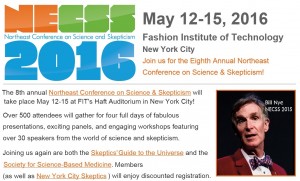 This past weekend at NECSS 2016 we invited science journalist John Horgan to give a talk on “Skepticism: Hard Versus Soft Targets.” We’re always game for some critical introspection. It keeps things interesting if nothing else.
This past weekend at NECSS 2016 we invited science journalist John Horgan to give a talk on “Skepticism: Hard Versus Soft Targets.” We’re always game for some critical introspection. It keeps things interesting if nothing else.
Unfortunately the talk, which he has now published on Scientific American’s website (which means it’s fair game), was more than a bit disappointing – not because he was critical, but because he does not seem to get skepticism with a small or a big “S.” The result was a string of cherry picked strawmen.
He begins:
“I hate preaching to the converted. If you were Buddhists, I’d bash Buddhism. But you’re skeptics, so I have to bash skepticism.”
That makes you a contrarian, not a skeptic. How about telling it like it is? Most ideas and movements are a mix of good and bad, and it often takes some effort and nuance to tease this apart. Or, you can just “bash” an entire philosophy simplistically because you fancy yourself an independent thinker. There is also nothing wrong with “preaching” to the choir – it’s not about conversion, but education.
Continue Reading »
May
16
2016
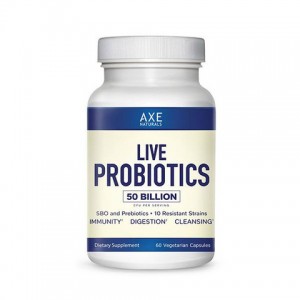 The idea behind probiotics superficially sounds reasonable – friendly bacteria are important to the functioning of our gastrointestinal (GI) system and immune system. Probiotic products are supposed to supplement those friendly bacteria with live bacteria from certain foods, such as yogurt, or even in capsules.
The idea behind probiotics superficially sounds reasonable – friendly bacteria are important to the functioning of our gastrointestinal (GI) system and immune system. Probiotic products are supposed to supplement those friendly bacteria with live bacteria from certain foods, such as yogurt, or even in capsules.
A recent paper, however, reviews studies looking at probiotics in healthy subjects, finding no evidence for benefit. Let’s take a close look at this study and the science of probiotics.
The systematic review focused on studies looking at the change in the composition of bacteria in feces in healthy adults taking probiotics compared to placebo. They found:
Seven RCTs investigating the effect of probiotic supplementation on fecal microbiota in healthy adults were identified and included in the present systematic review. The quality of the studies was assessed as medium to high. Still, no effects were observed on the fecal microbiota composition in terms of α-diversity, richness, or evenness in any of the included studies when compared to placebo. Only one study found that probiotic supplementation significantly modified the overall structure of the fecal bacterial community in terms of β-diversity when compared to placebo.
Continue Reading »
May
10
2016
 Here is a non-controversial topic – some attorneys general in the US are exploring the idea of criminal charges against certain climate change deniers. This round of the climate debate was triggered by New York Attorney General Eric Schneiderman who issued a subpoena to ExxonMobil for financial records, e-mails, and other documents. This was followed by Attorney General Claude E. Walker of the U.S. Virgin Islands who issued a subpoena to the Competitive Enterprise Institute (CEI) for their documents related to their climate research and policy activity.
Here is a non-controversial topic – some attorneys general in the US are exploring the idea of criminal charges against certain climate change deniers. This round of the climate debate was triggered by New York Attorney General Eric Schneiderman who issued a subpoena to ExxonMobil for financial records, e-mails, and other documents. This was followed by Attorney General Claude E. Walker of the U.S. Virgin Islands who issued a subpoena to the Competitive Enterprise Institute (CEI) for their documents related to their climate research and policy activity.
Investigation of oil companies is partly financial, did they mislead investors and overvalue their companies by ignoring the financial costs of climate change and the potential of having to leave fossil fuel assets in the ground?
Investigation of the CEI has a different focus, are they engaged in a conspiracy to mislead the public and affect public policy by knowingly manufacturing false doubt about the science of climate change? Continue Reading »
 Do we truly have free will? This is a vexing question, and as with the question of consciousness, there are complementary philosophical and neuroscientific approaches. Philosophy gives thoughtful possible answers given what we know, but neuroscience advances what we know.
Do we truly have free will? This is a vexing question, and as with the question of consciousness, there are complementary philosophical and neuroscientific approaches. Philosophy gives thoughtful possible answers given what we know, but neuroscience advances what we know.
 Mother Jones headline declares:
Mother Jones headline declares: 
 Yesterday I saw a bumper sticker that stated, “Save the Bees, Buy Organic.” Of course, a bumper sticker is not the place for a nuanced or thorough treatment of a complex topic. It is a venue suitable for simplistic slogans.
Yesterday I saw a bumper sticker that stated, “Save the Bees, Buy Organic.” Of course, a bumper sticker is not the place for a nuanced or thorough treatment of a complex topic. It is a venue suitable for simplistic slogans.
 A genetic testing company, Myriad,
A genetic testing company, Myriad, This past weekend at NECSS 2016 we invited science journalist John Horgan to give a talk on “Skepticism: Hard Versus Soft Targets.” We’re always game for some critical introspection. It keeps things interesting if nothing else.
This past weekend at NECSS 2016 we invited science journalist John Horgan to give a talk on “Skepticism: Hard Versus Soft Targets.” We’re always game for some critical introspection. It keeps things interesting if nothing else. The idea behind probiotics superficially sounds reasonable – friendly bacteria are important to the functioning of our gastrointestinal (GI) system and immune system. Probiotic products are supposed to supplement those friendly bacteria with live bacteria from certain foods, such as yogurt, or even in capsules.
The idea behind probiotics superficially sounds reasonable – friendly bacteria are important to the functioning of our gastrointestinal (GI) system and immune system. Probiotic products are supposed to supplement those friendly bacteria with live bacteria from certain foods, such as yogurt, or even in capsules. Here is a non-controversial topic – some attorneys general in the US are exploring the idea of criminal charges against certain climate change deniers. This round of the climate debate was triggered by New York Attorney General Eric Schneiderman who issued a
Here is a non-controversial topic – some attorneys general in the US are exploring the idea of criminal charges against certain climate change deniers. This round of the climate debate was triggered by New York Attorney General Eric Schneiderman who issued a




